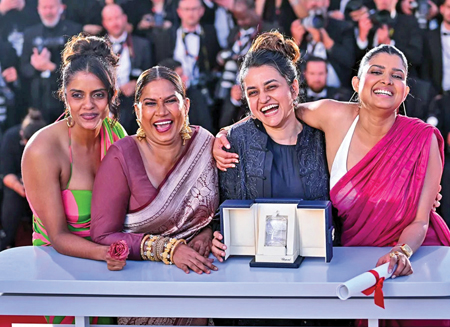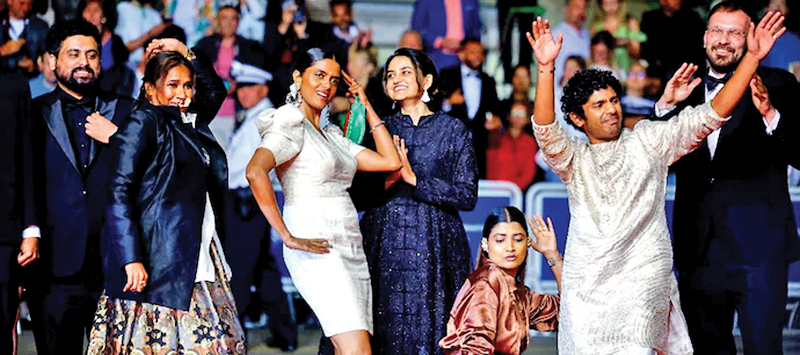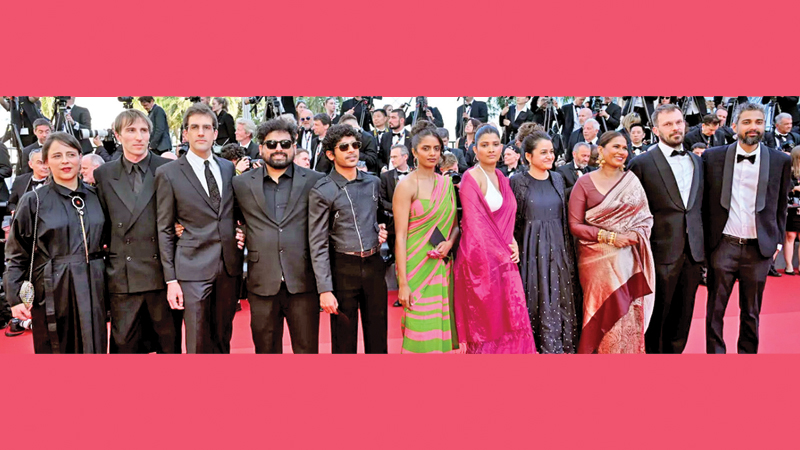 This year’s Cannes Film Festival was a significant milestone for Indian cinema, particularly for women filmmakers, with 14 films and talents from India, South Asia, and the diaspora selected for Festival de Cannes. Among these selections were four winners, marking a notable achievement for Indian cinema on the global stage.
This year’s Cannes Film Festival was a significant milestone for Indian cinema, particularly for women filmmakers, with 14 films and talents from India, South Asia, and the diaspora selected for Festival de Cannes. Among these selections were four winners, marking a notable achievement for Indian cinema on the global stage.
Notable successes included Payal Kapadia’s ‘All We Imagine As Light’, which received the Grand Prix or Jury Prize in the Competition category. Anasuya Sengupta won Best Actress in Un Certain Regard for ‘The Shameless’, and Chidananda S Naik was awarded the first prize for ‘Sunflowers Were the First Ones to Know’ in La Cinef.
‘Sunflowers Were the First Ones to Know’, a Kannada film by Chidananda Naik produced by the Film and Television Institute of India (FTII, Pune), was particularly noteworthy, being selected among 18 shorts from a pool of 2,263 submissions.
Renowned Director of Photography Santosh Sivan ASC ISC was honoured with the Pierre Angenieux ExcelLens in Cinematography award. ‘Santosh’, directed by Sandhya Suri and featuring Shahana Goswami and Sunita Rajwar, received acclaim for its exploration of how the police handle Dalit and low-caste cases in Indian society.
Radhika Apte starred in ‘Sister Midnight’ by Karan Kandhari, featured in the Directors’ Fortnight section. A restored version of Shyam Benegal’s classic film ‘Manthan’ starring Girish Karnad, Smita Patil, and Naseeruddin Shah, was showcased in Cannes Classics before its theatrical release in India on June 1 and 2.

All we imagine as light by Payal Kapadia – Grand Prix (www.festival-cannes.com)
Highlighting the broader South Asian cinema participation, notable entries included Ashok Vish (India) and Maria Estela Piaso’s (Philippines) ‘Night Birds’ as well as Gogularaajan Rajendran’s (Malaysia) and Eve Baswel’s (Philippines) ‘Walay Balay’. These shorts were selected in the Directors’ Fortnight at Cannes, showcasing the diverse talent and stories from the region.
Other remarkable entries included Anna Hints and Tushar Prakash’s Estonian short ‘Sauna Day’ in the Semaine de la Critique, and Bangladesh’s Tanveer Hossain as a producer for Arvin Belarmino’s ‘Radikals Philippines’ in the Semaine de la Critique Shorts Competition. Noteworthy mentions also included Maisam Ali’s ‘Retreat’ in the ACID section and Sadia Khalid Reeti’s participation in the Fipresci Jury, highlighting the global recognition and collaboration within the cinematic community in South Asia.
Shift in the narrative
The scene at the Cannes red carpet this time was truly surreal, as it was invaded by a multitude of Indian women adorned in vibrant colours, showcasing their exotic Indian dances. This display, quite new in an European A-grade film festival, can be attributed to the multiculturalism discourse. It not only highlighted the invasion of multiculturalism but also symbolised the ambitious results of the women empowerment discourse in the global political arena for the past few decades. The influence of this feminist wave, a conscious twist in the global phenomena, was not only evident on the red carpet but also resonated in the themes of the award-winning films at the festival.
‘The Shameless’ by Konstantin Bojanov can be considered the South Asian version of ‘Titane’ by Julia Ducournau, which won the Palme d’Or in 2021. In both films, a woman rebels against the patriarchal norms of society, and Anasuya Sengupta’s Best Actress award in Un Certain Regard for her role serves as a testament to the portrayal of a rebellious woman as a role model in South Asian cinema.
Over the past few decades, gender equality and identity politics have taken center stage globally, leading to a gradual shift from a male-centric to a more female-centric society. Today, we find ourselves in a world that is increasingly inclined towards feminine values and perspectives. This transformation in societal norms is reflected in world cinema, which has always served as a progressive medium to forecast and interpret societal changes, as well as a medium for transforming soft power.
For a careful observer in recent years, award-winning films in A-grade film festivals is evident fact that films such as ‘Anatomy of a Fall’ by Justine Triet (Palmed’Or 2023) , ‘Poor Things’ by Yorgos Lanthimos (Golden Lion at 80th Venice International Film Festival 2023), ‘Titane’ by Julia Ducournau, (Palmed’Or 2021), and ‘The Shameless’ (Best Actress, Uncertain Regards, Cannes 2024), have predominantly focused on portraying and emphasising the presence and empowerment of women, signifying a significant shift in cinema and society alike. These films not only emphasise the importance of women’s existence but also challenge and subvert the traditional patriarchal norms that have long dominated society.
The recognition of women’s narratives and their impact on challenging the patriarchal structure are now at the forefront of cinematic storytelling, reflecting the broader cultural evolution towards gender equality and empowerment rooted in identity politics.
Sri Lanka, despite its relatively small presence in the global film industry and economy, can still acknowledge and benefit from the significant influence exerted by Indian filmmakers at the prestigious Cannes Film Festival this year and from the recognition and spotlight South Asia has received in the global festival arena over the past few years. While Sri Lanka may have limited representation at Cannes and other global film festivals compared to countries like India, the historical and cultural ties between the two nations provide a unique opportunity for collaboration and growth. A noteworthy contribution has been made by the renowned Sri Lankan filmmaker Prasanna Vithanage, who has cultivated a strong and enduring connection with South India over the years. His most recent Indian-Sri Lankan co-production, ‘Paradise,’ presented by Mani Ratnam and Siva Ananth under the Madras Talkies banner and produced by Newton Cinema, has been showcased at various acclaimed film festivals globally, receiving recognition and accolades. It is ready for release in India as well as other parts of the world, including Sri Lanka.
Opportunity for Sri Lanka
Sri Lankan cinema should consider this a turning point and explore more opportunities to collaborate with Indian producers, cast, and crew through co-productions. A few noteworthy emerging filmmakers are actively embracing these international opportunities, which hold immense potential for growth and exposure. A recent successful example is Ilango Ram, who won a Jury Prize at the Tallinn Black Nights Film Festival in 2023 for his debut feature ‘Tantigo,’ which is now being remade in India with an authentic Indian cast and crew. As a country, it is important to celebrate these ambitious ventures into the global film arena and appreciate their contributions, rather than viewing them as isolated, one-off attempts if we aim for the industry’s evolution and expansion. Additionally, fostering closer ties with India in the film industry can open up avenues for knowledge exchange, talent sharing, co-productions, and joint ventures. This collaboration could lead to the creation of diverse and innovative cinematic works that blend the cultural elements of both nations, appealing to a wider global audience.
From time to time, Sri Lanka has made notable appearances at the Cannes Film Festival and other A-grade film festivals. Our homegrown talent, Vimukthi Jayasundara, has yet to win one of the leading awards at the Cannes Film Festival but has received international recognition for his work, putting Sri Lanka on the global cinematic map.
It is evident that for a tiny island with limited market potential and economy, we have been able to come into the spotlight and capture the attention of international A-grade film festivals, particularly during times of significant national strife and when the country was making international news. Often, the films that won attention in the A-grade film festival arena were issue-based cinema. Therefore, one can argue that the outside world views us through an anthropological lens, which is understandable for an under-developed country like ours.
However, it is paramount for filmmakers in Sri Lanka to accept and understand this global phenomenon and create a film discourse based on these realities. Instead of making excuses about the challenges faced by the Sri Lankan film industry due to socio-political upheavals, including limited resources and infrastructure, artists should strive to understand and capture the country’s unique narratives and artistic expressions. By engaging in regional co-producing opportunities, there is genuine potential to bring international attention to Sri Lankan cinema.
Overall, by recognizing and embracing the influence of Indian filmmakers at events like the Cannes Film Festival, Sri Lanka has the potential to position itself as a hub for creative collaborations, cultural exchanges, and artistic endeavors, paving the way for mutual growth and success in the dynamic landscape of world cinema.

Chhaya Kadam on ‘All We Imagine as Light’ and how the entire team broke all rules at Cannes, by not walking on the red carpet, but by dancing on it






